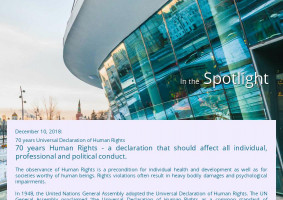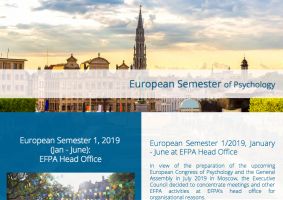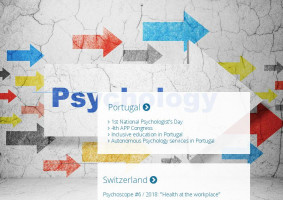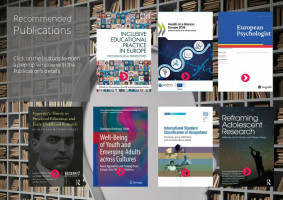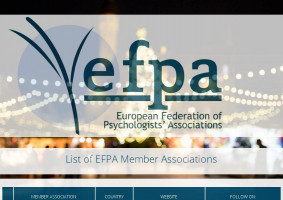Portugal
1st National Psychologist's Day
4th APP Congress
Inclusive education in Portugal
Autonomous Psychology services in Portugal
National Psychologist's Day
The National Psychologist's Day was held for the first time on September 4 in Portugal, after the Portuguese Psychologists’ Association (PPA) submitted an application to the Portuguese Parliament.
Although symbolic, this is the social and political recognition of the work of all psychologists in the most varied areas.
During this day, in addition to the various interviews given by Francisco Miranda Rodrigues, PPA’s President, several initiatives were carried out all over the country, such as the "OPP Open Day" and the launch of the PPA and “Ideias com História” children’s book (authorship of Rute Agulhas and Joana Alexandre)
Do you know what psychologists do?
4th APP Congress
Between September 12 and 14 was held the largest Psychology event of the year in Portugal: The 4th Portuguese Psychologists’ Association (PPA) Congress.
During 4 days, 1,600 attendees were present at the Braga Forum and attended 650 communications.
We highlight the presence of nine countries represented and several national and international speakers who addressed the most varied themes of Psychology, as well as new trends such as the role of Psychology in "Fake News" or "Artificial Intelligence".
The 5th OPP Congress will be held in 2020.
Inclusive education in Portugal
A decree-law on inclusive education was recently approved in Portugal. This decree-law establishes the principles and norms that guarantee inclusion, as a process that aims to respond to the diversity of the needs and potential of each and every one of the pupils, by increasing participation in the processes of learning and educational community life.
This decree-law also identifies the measures to support learning and inclusion, the specific curricular areas, as well as specific resources to be mobilized to meet the educational needs of each and every child and young person along the school path, in all different education and training offerings, and applies to school clusters and non-grouped schools, professional schools and establishments of pre-school education and basic and secondary education of private, cooperative and solidarity networks, here in after referred to as schools.
Selective measures aim to fill the needs for learning supports not provided by the fulfilment of universal measures are, for example, Psycho-pedagogical support. Each school shall have a multidisciplinary team to support inclusive education, such as a psychologist.
Autonomous Psychology services in Portugal
Based on the measures presented by a Working Group (Portuguese Psychologists’ Association (PPA) was part of), the State Department of Health published an Order that determines the creation of autonomous Psychology services.
According to this law,
through health promotion and disease prevention, the aim is to improve the quality of health care by focusing on health governance models based on continuous improvement, effectiveness, quality and In this context, psychology assumes itself as an area whose valorization will bring considerable gains in health to the Portuguese population.
Psychologists today take on the role of health professionals with technical and formative skills that allow the autonomous exercise of their profession, in a process of interdisciplinary articulation, which supports the provision of the best health care to the population.
Also noteworthy is the first point of the Order, which states that "the model of organization and functioning of Clinical Psychology and Health in the National Health Service should be based on the principle of scientific, technical and functional autonomy and collaboration interdisciplinary and interprofessional centered on the user and in the scope of teamwork, based on a model of integration of care, which supports the provision of the best health care to the population. This is another highlight in our short history and it brings even more responsibility to all psychologists.
Now, it is up to us, together, to move towards the implementation of the order, ensuring more and better psychology services to citizens.

Switzerland
Psychoscope #6 / 2018: "Health at the workplace"
United Kingdom
Psychologists and psychiatrists come together to combat polarisation in mental health debate │BPS

The chief executive of the British Psychological Society (BPS) and the president of the Royal College of Psychiatrists (RCPSYCH) have called on the mental health professions to build “a coalition of trust, goodwill and an unwavering commitment to better mental health”.
In a joint statement published in The Lancet Psychiatry, Sarb Bajwa from the BPS and Wendy Burn from the RCPSYCH, together with the journal’s editor Niall Boyce, say much has been learnt over recent decades about the causes and treatment of mental health problems.
However, as well as contested ideas and beliefs, they say, the field of mental health has generated polarisation, bitterness and intransigence.
The authors say that good debate between mental health professionals should be respectful, constructive, and conducted in good faith, with conviction and good intention. They say that it is necessary to recognise the complexity of the issues that arise within mental health professions, and accept that this means that no single approach will provide all of the answers, with multiple perspectives and partnerships representing the route to progress. T
he BPS and RCPSYCH hope that the suggestions made in the piece provide much-needed common ground, and platform for us to create a future with better mental health for all.
Update regarding legal
development
Greece: AGP applied to protest about the title of psychologist
Latvia: Psychologists’ profession is regularized since 01.03.2018.
Malta: New law on psychotherapy
AGP applied to protest about the title of psychologist
by
Vassiliki Boukouvala
On the 27thSeptember 2018, the Association of Greek Psychologists (AGP) applied to the :
Council for Professional Recognition- Ministry of Education,
Health Directorate of the Attica Region in Greece,
in order to protest about the professional recognition of the title of Psychologist by depositing a 3-year Bachelor’s degree. The AGP declared that it has all the rights to appeal at any National or European judicial or administrative authority and to request the protection of the profession of the Psychologist. The letter of EFPA was included.
The application was also addressed to the:
Legal Service of the Ministry of Education
Legal Service of the Attica Region
Executive Secretary of the Attica Region
Legal Service of the Ministry of Finance
Legal Council of the State
Minister of Education, Mr. Kostas Gavroglou
Minister of Finance, Mr. Euclid Tsakalotos
Minister of Health, Mr. Andreas Xanthos
Latvia Psychologists’ profession is regularized since 01.03.2018
by
Evelina Muze
Latvia Psychologists’ profession is reglemented since 01.03.2018. Transitional period will be ended on 31.12.2018.
The LPPA together with the Ministry of Education and Science and other professional organizations is elaborating many documents to organise a process of "Psychologists law’’ implementation.
The essence of this law is psychologist’s certification on the base of trial. LPPA does not support as previously those points of this law, which are different from EuroPsy certificate request and does the best to make the possible changes in this law.
Update on the psychotherapy law
by
Roberta Farrugia Debono
In June 2018 – after many months of negotiations - the psychotherapy law was passed in Maltese parliament.
Whilst the Malta Chamber of Psychologists (MCP) supported the introduction of an Act that regulated the psychotherapy profession locally, we staunchly objected to a law which by its’ very definition was attempting to preclude psychologists from freely practicing psychotherapy.
As a Chamber we became very involved in negotiations with the legislator insisting that the new law would not impinge on the work of the psychologist in Malta.
MCP had the full support of EFPA in this and a letter was written by Dr. Telmo Murinho Baptista to the Minister in charge of the law.
In the end - after a number of meetings and intense lobbying - with members of parliament as well as a strong collaboration with the Malta Association of Psychiatrists, the law was passed with the changes we had requested to the Bill - as it had originally been presented.
The law now states its provisions do not apply to other professions that are regulated by their own statutory body, thereby safeguarding the Psychology Profession in Malta which has been regulated by the Psychology Profession Act since 2004.
Poland
News from the Polish Psychological Society
Legal development
Legislative work is currently under way on the Psychology Profession Act. The process is complicated, but the psychological community insists that the bill should be passed. The profession of a psychologist enjoys high esteem and respect. Psychologists play an important role in many areas of social life.
Education
In Poland, psychology is a very popular major among university students. Students of psychology can pursue a diploma at state universities and non-public higher education institutions. The large number of candidates wanting to enrol in psychology courses requires that a high quality of instruction be maintained by lecturers and the institutions which offer those courses.
Activities
Among the many activities of the Polish Psychological Society, mention should be made of its role as an awarding body for psychotherapy certificates as well as certificates for specialists in other areas of psychology.
Moreover, the Polish Psychological Society publishes a quarterly called Review of Psychology, which features peer-reviewed papers of high scientific merit. The quarterly is published in English and Polish. Members of the editorial board are some of the most eminent Polish psychologists and world-renowned psychologists with expertise in various areas of psychological knowledge.
Achievements
Among the most important recent achievements of the Polish Psychological Society is the appointment of the National Awarding Committee for EuroPsy, which awards EuroPsy certificates to Polish psychologists. This is the most important achievement of the last period. First certificates have already been issued.
General meeting:
In November 2019, the General Meeting of the Polish Psychological Society will be held, during which members will assess the activities of the Society during the last term of the General Board. New authorities of the Polish Psychological Society will also be elected during that meeting.
_w292_h382_1.png)




